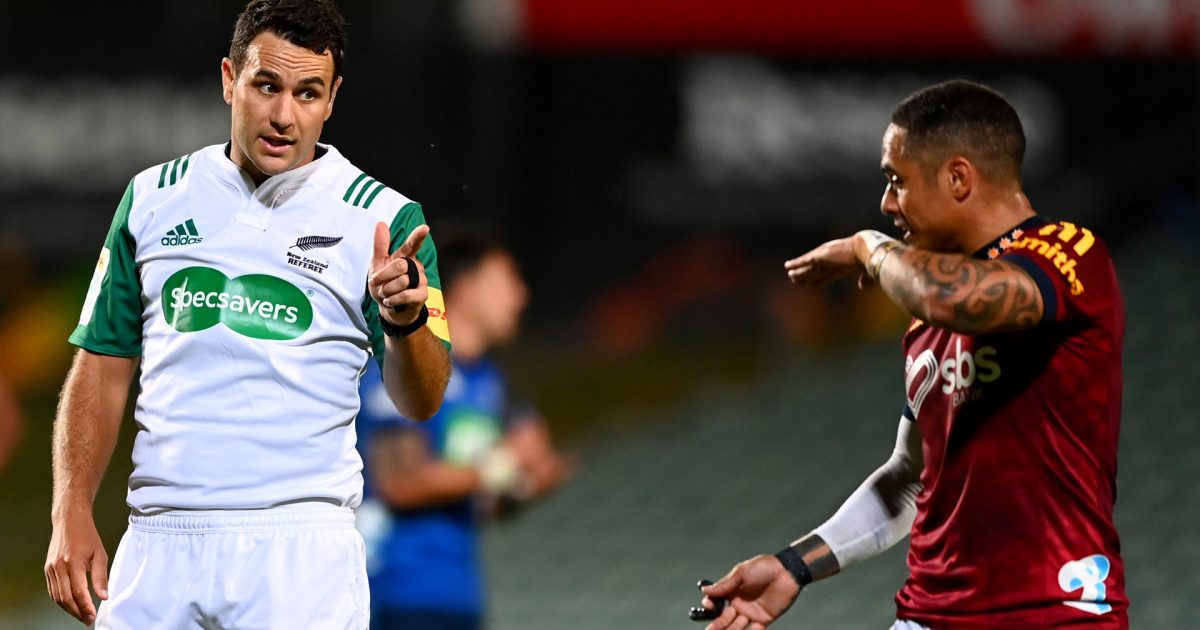'They are slow': Kiwi ref highlights the concerning trend with New Zealand Super Rugby teams

Kiwi referee Ben O’Keeffe has critiqued the ruck work of the New Zealand Super Rugby Pacific teams over the first four weeks of the competition compared to that of the top Northern Hemisphere sides.
Joining the panel on Sky Sport’s The Breakdown, he said it was “no surprise” the All Blacks were soundly beaten by the likes of Ireland and France in November, who he said are playing a faster game than the teams in New Zealand.
Having refereed in last year’s Six Nations and the British & Irish Lions tour of South Africa, O’Keeffe made note that European teams are attacking the breakdown more effectively to create quicker ball speed than what Kiwi sides have done in recent times.
“I think you’ve seen in the first few rounds of Super Rugby this year, they are slow,” O’Keeffe told The Breakdown of the ruck recycle speed in Super Rugby Pacific.
“The game is slow, we are not getting that quick ball we’ve had over the last few years.
“Six Nations, when I reffed it last year, it was slow, this year it is fast. I think it is no surprise that we saw Ireland and France play like they did in November.
“It’s our responsibility as referees to get that player rolling out, the players are trusting the referee that they will get that role, the clean is coming in high and getting quick ball out.
“There is that balance that the referee has got to do their job too, to get a fast game.”
O’Keeffe’s comments came after ex-All Blacks wing Jeff Wilson highlighted numerous instances in Super Rugby Pacific games between Kiwi teams where the cleaning support players had targeted the tackler on the ground, or had taken a poor angle and ended up on the ground themselves.
As a result, many attacking players have ended up on the ground making a mess of the ruck and creating slow recycles, whilst also being susceptible to poachers coming over the ball late and counter-ruck pushes.
By contrast, Wilson illustrated that the Northern Hemisphere teams were much better at staying on their feet and over the ball without worrying about the tackling player already on the ground.
Wilson emphasised that the difference in clean-out methods is the result of a different coaching styles, something of which he said “100 percent” needs to be addressed in New Zealand.
“I think there has been a significant change. The Northern Hemisphere are not worried about sealing the possession, they are coming in upright and punching through and making the ball available,” Wilson said.
“With us, we’ve talked about these pod systems, we are protecting the ball, we are sealing it off first, and that puts three bodies on the ground.
“No one on the defence spends any players contesting. You can stay on your feet, and what have you got in attack, you’ve got 11 on 14 in the front line.
“That to me, is a recipe for disaster, and you are going to get turned over at the breakdown.
“It is a change we need to make. Our game, our best game, surely is when we are standing up. The more players on their feet, the better we will be.
O’Keeffe concluded that officials are not there to coach players to clean-out properly and that the work has to be done during the week to ensure the cleaners are “driving, not diving”.
The lack of accuracy in that area has resulted in a stark rise in the number of penalties conceded by players going off their feet at ruck time in Super Rugby Pacific this season.
“I think it goes two ways. You’ve got to be coached to be accurate during the week, to hit rucks upright so they are driving, not diving,” O’Keeffe told The Breakdown.
“It shouldn’t be our responsibility [to coach players as referees], because we will do it on Saturday, we will have to penalise it. There has been a lot of penalties for ‘off feet’ in Super Rugby this year.
“People don’t want to see us coaching them to do it, so learn it during the week, and if you’re penalised on the weekend, it’s because you got it wrong.”
























































